Diary Romagna, testimonies from the flood. Part 4: pottery workshops
The fourth installment of Diario Romagna is dedicated continues with testimonies from two Faenza ceramics workshops, a historic one, Alloy Ceramics, active since 1950, and a young one, Pantou Ceramics, opened in 2022. The account of the managers and volunteers who worked and toiled to save their equipment and production from the mud of the flood that hit Romagna last May 16.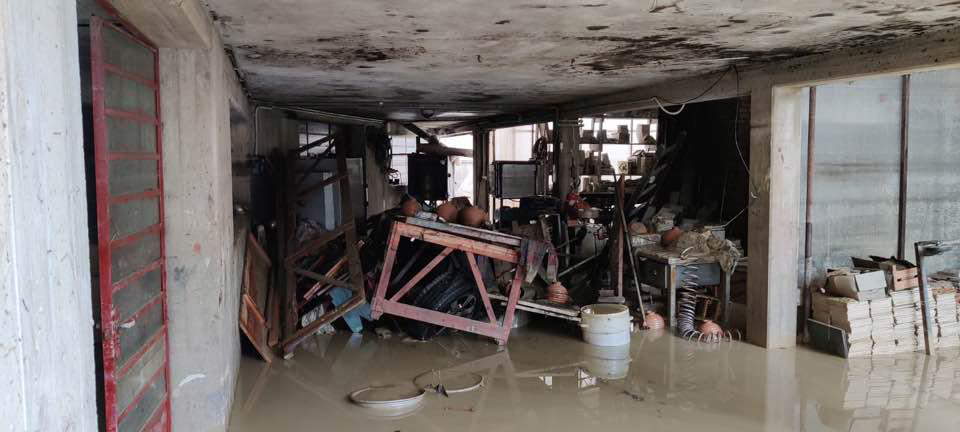
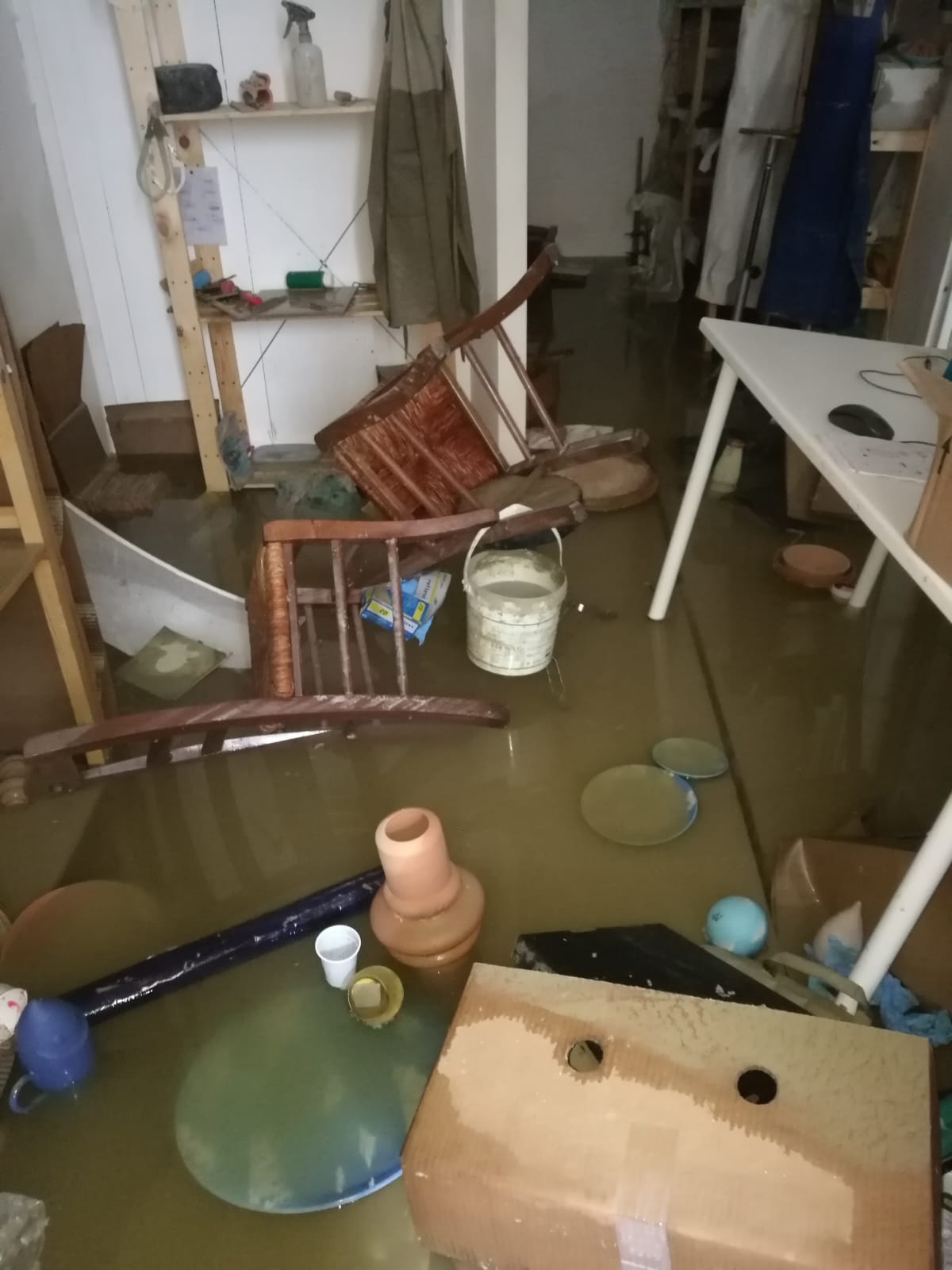
Carlotta Bosi
The colors were gone. The green and coppery red of the glazes, the creamy white of the plaster molds, the brown of the cookie had all been replaced by a single gray-brown tone.
Everything had been spilled, smashed, stirred, crushed, and covered with mud.
It was instinctive for us to put on boots, gloves and roll up our sleeves.
There can be many key words for those days: toil, sweat, dirt, push, move.... But above all these win: discovering, laughing, hugging, toasting, rejoicing, helping. We felt part of a big, chaotic, family.
Elisa Mingozzi
It’s Tuesday, May 16, in the office in Milan, the news is talking about heavy rains in Romagna with probable river overflows, even flooding... “Elisa, how is the situation at home at your folks’?” my colleagues ask politely. I don’t know anything more than they do, how scary, I take courage and call home. We’re fine, my dad says, but the firemen knocked on the door to evacuate us, “let’s go sleep at your Uncle Orpheus’ tonight, but it’s just a precaution.” In Ravenna it may be a precaution, but all around the water is coming. Rivers have broken their banks, water and mud are invading roads, houses, land, agricultural canals, stores... all of Romagna is under water, everything is destroyed.
If I leave now can I get there? I ask friends and relatives. No luck, the railroad is broken, the roads the same. Collect basic necessities in Milan, which are in short supply here, and come and bring them as soon as you can, they tell me. I do, of course I do, but that can’t be enough-I want to help those who have lost everything, I have to help those who have lost everything. And then, to be honest, I am the one who needs to help those who are there in the midst of this disaster, I am the one who from a distance cannot breathe if my Romagna, my home, is on its knees.
“Marti how are you doing?” I ask. “Shitty, the lab is flooded.” My eyes are filled with tears in a split second. Martina is a young ceramist from Faenza, Italy, carrying on the tradition of her grandfather Leandro Lega along with her mother Carla. Their work struck me straight to the heart: one day in December I was wandering around Faenza with Uncle Orfeo who wanted to give me a gift, I saw their work and already knew that one of those wonderful pieces would end up in my home. What I didn’t know is that in the store I would find Martina herself: outspoken, passionate and engaging ... she had the same effect on me as her ceramics, love at first sight! Is it not by chance, I say by chance, that the art reflects the personality of the person making it? I don’t know eh, I say. Anyway, much of the work, the art, the labors of this family are now under meters of mud ... and I can’t do anything but cry. No but what am I saying? Siam romagnoli we, oh! Marti, as soon as they clear the roads I come to you to help. When I arrive I find a community of dozens of people working hard, each in their own way: washing the molds, sweeping the floor, going “hydro,” oh my God but how far did the water go? Up to the ceiling, and beyond to the floor above! The mud is everywhere, even where you didn’t think it could reach. Oh my God but what about Grandpa’s pots? We are washing them, much has been saved fortunately! And that’s where the energy comes from, from grandpa’s pots that have weathered this disaster, if they made it we can make it too. We are together, we are many, old friends and strangers who become friends after only a minute: who brings salami, cracklings, cherries, who brings wine, who brings cleaning tools, who brings a smile. There is no shortage of talk and laughter, no time and no room for discouragement, there is to do. And we do, a lot. Martina, Carla and the whole family tell us thank you every minute, but the answer is never what you expect, it’s never “you’re welcome.” Instead, we have “stop it,” “enough,” “are you done?”, “and what the hell are these thanks”: we cannot accept a thank you because we are not there for them, we are there for us, for all of us, for all of Romagna. And it doesn’t end here, there is and will still be so much to do, so many problems and difficulties to face, but we will make it, We.
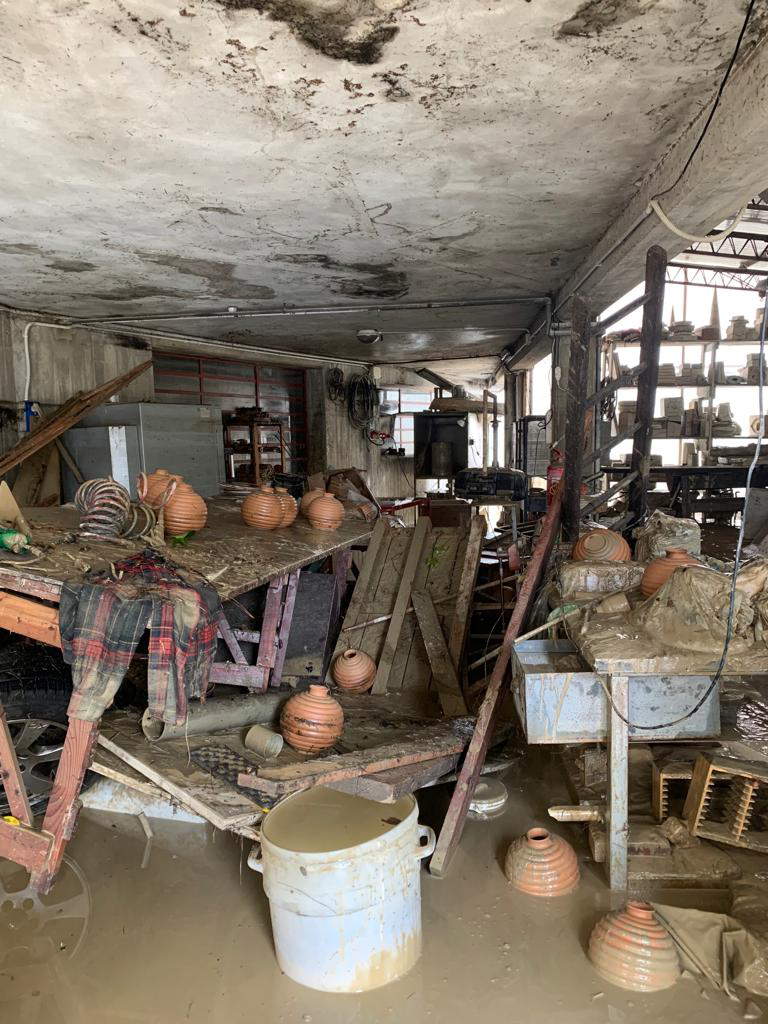 Ceramics
Ceramics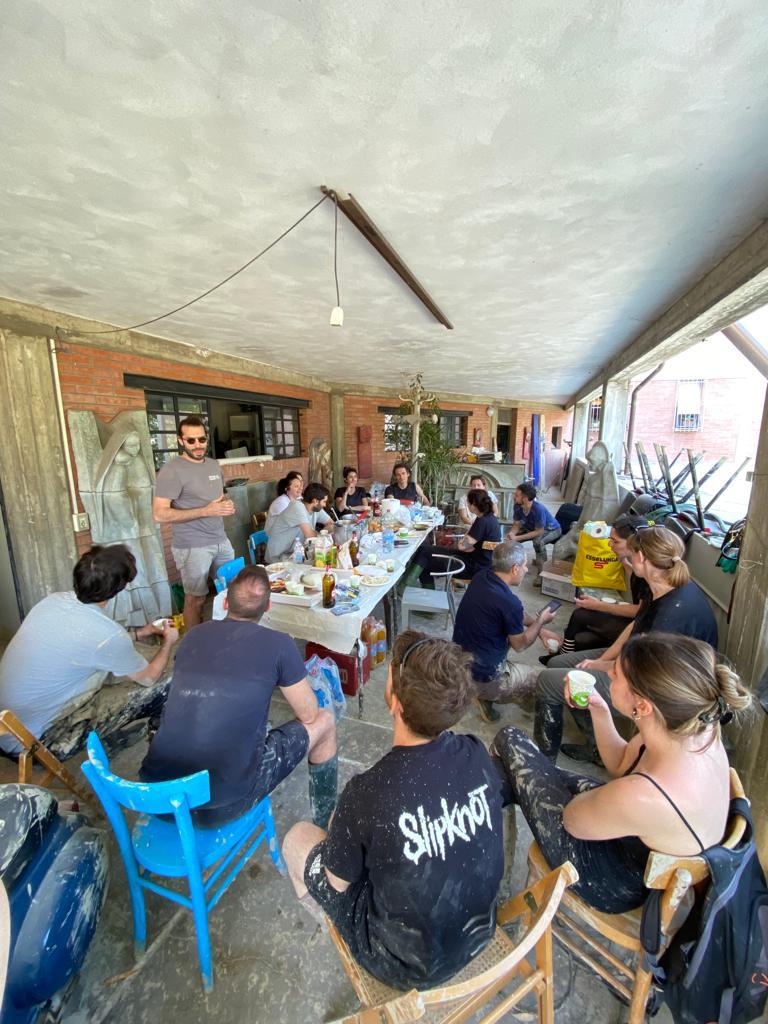 Ceramics
Ceramics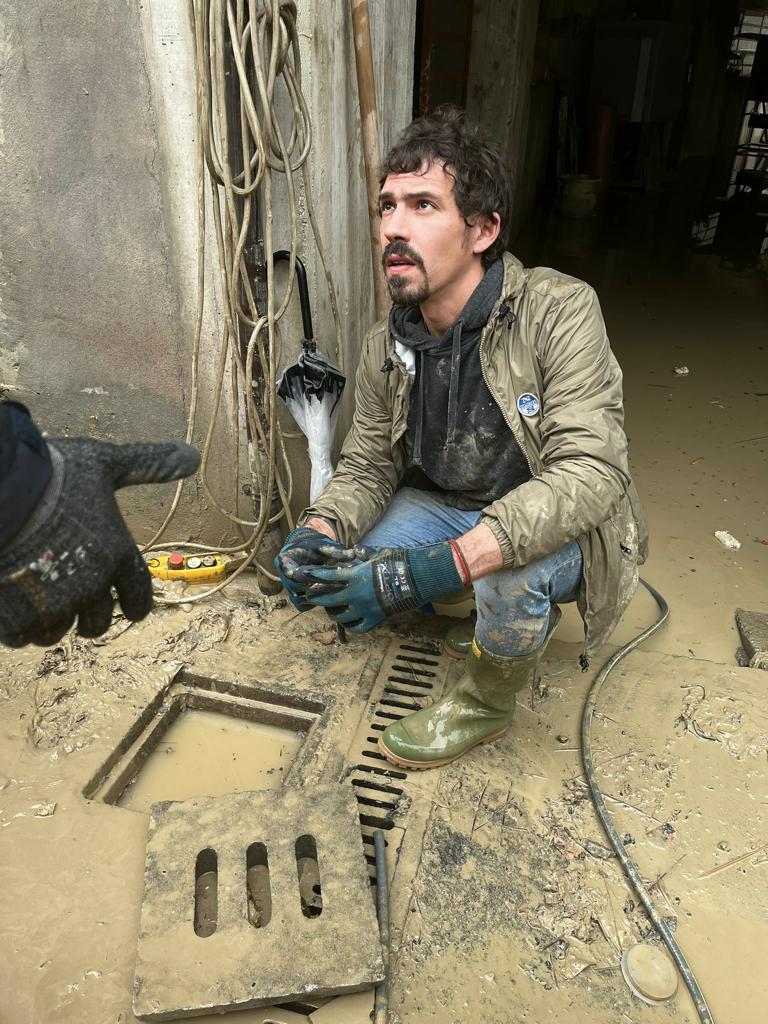 Ceramics
Ceramics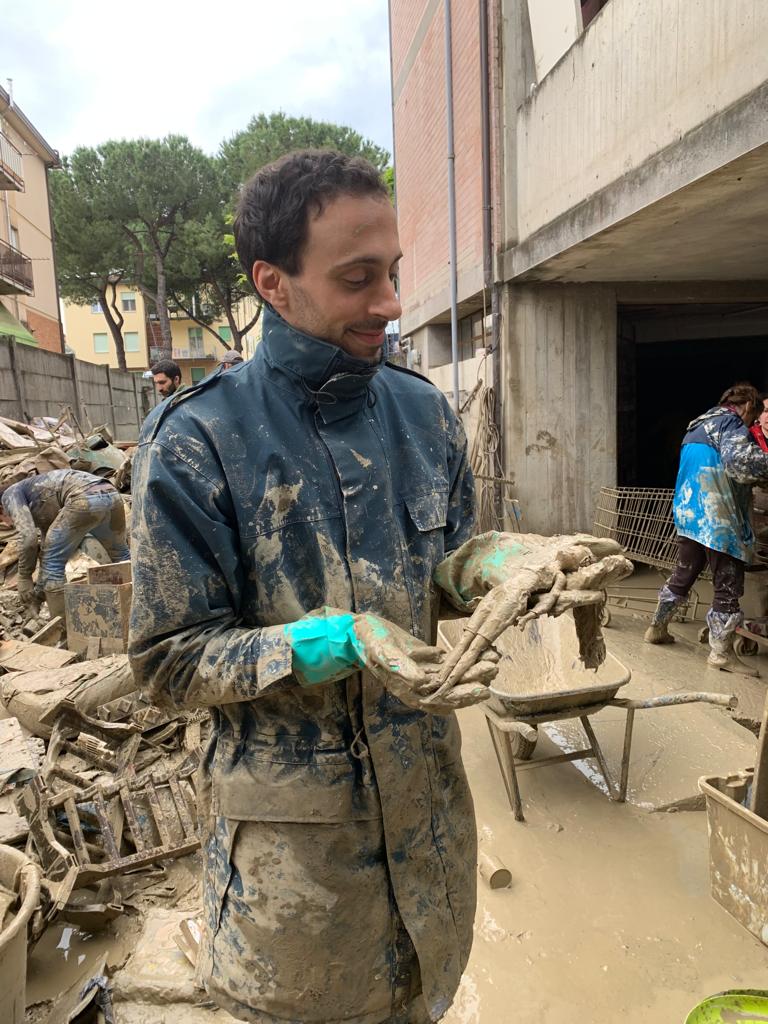 Ceramics
Ceramics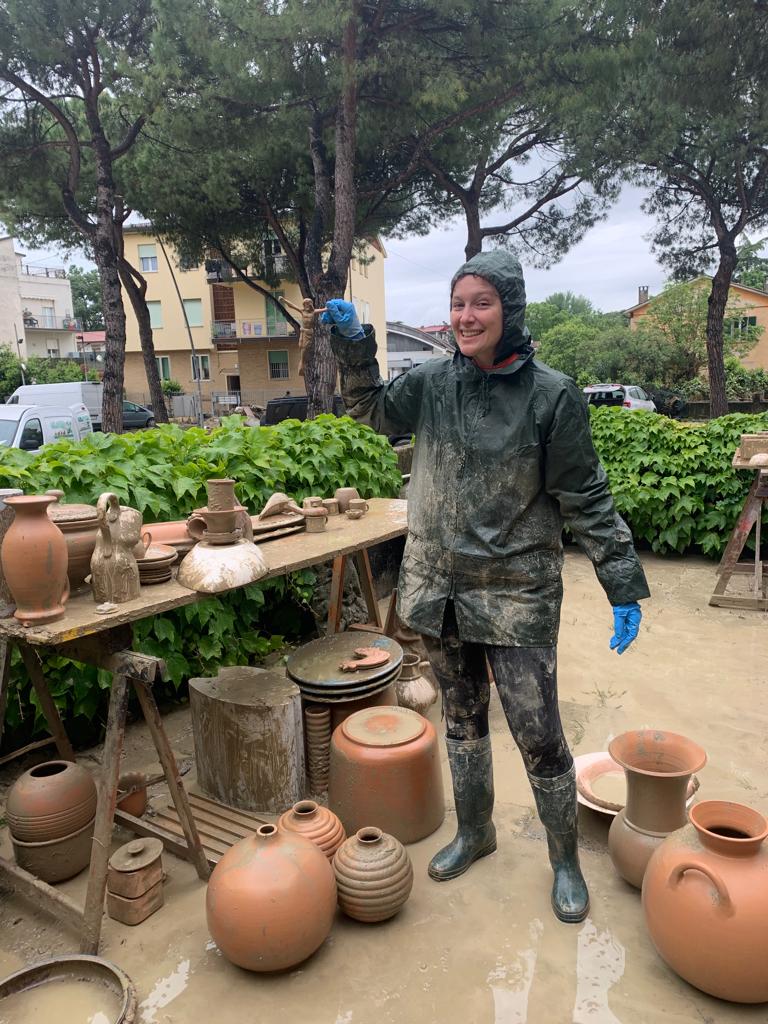 Pottery
PotteryFiorenza Pancino
I arrive in Faenza on the evening of June 17, after a family bereavement. I run to see the area where my friend Elvira has her house-had she? A beige lake, what an ugly color.
The next day we arrive at her house, passing through mud and lots of people helping. When I enter the house I want to cry but I get yelled at, held back and for ten days Andrea and I are in charge of choosing from the whole family’s clothes what to keep and what to throw away, and then washing and dry cleaning for days. A colleague is also in need and we do it for her as well.
“Emotional shock” is the title of one of my works: here, we are faced with this. Some people get overwhelmed by panic, and as in nature they freeze, they make themselves dead. Others react immediately and the adrenaline becomes contagious, many help. Looking at the event from another point of view I think nature shows her strength, her power, man understands that she is in charge.
From the symbolic point of view the mud, the darkness covers everything, the water that is the source of life can be the bringer of death. Washing, washing, washing for days brings back light, renewal, you look with detachment at things you considered fundamental, a painful, profound but absolutely powerful process in terms of rebirth.
Alessandro Roma for Bottega Alloy Ceramics
I was not in town when the Lamone River-which I have often watched with fascination-overflowed. The arteries that soften our small towns always block my attention; I dwell on every detail (reflections, depth transparencies, shapes...)
For the past few months I have been crossing the Lamone to go to work in the Lega workshop at Martina and Carla’s, and even on those occasions, I always pause to check its appearance.
Four days after the flood I returned to Faenza with much concern mixed with a desire to be able to help in the face of an event that was completely unfamiliar to me.
On arrival from the highway we are greeted by a cloud of dust enveloping the city.
I remain silent.
The first day I crossed the Lamone again on my way to Martina’s, I could not stop to observe it. It seemed unfair in the face of what I was seeing crossing the city.
Arriving at the store every word that came out of my mouth was so trivial in the face of what I was seeing. Carla greeted me with a smile and for a few seconds there was silence...then she says, “Your pottery was saved!!!” Martina was covered in mud and with great energy, which characterizes her in every situation, she greeted me with a bitter smile.
Around them was an unrecognizable place, where only two weeks earlier I had seen work being born with their support and warm company.
I found that same warm companionship, despite the tragedy, in the people who were helping to breathe life back into that place. All people who wanted to bring back to life a place that has been making not only pottery for generations, but believes in community.
Those were days when I shoveled, washed, lifted, dragged, supported, threw, all actions required of the body: my mind was finally there to assist and not to take over.
In that workshop I saw what people can do and be if they stop the mind taking over. Helping oneself means listening to oneself, and what I learned in those weeks was to feel through my body what a community can do. Helping oneself. I returned to look guiltlessly at the Lamone, which is unrecognizable, but I am sure it will shine again as well as the Lega workshop.
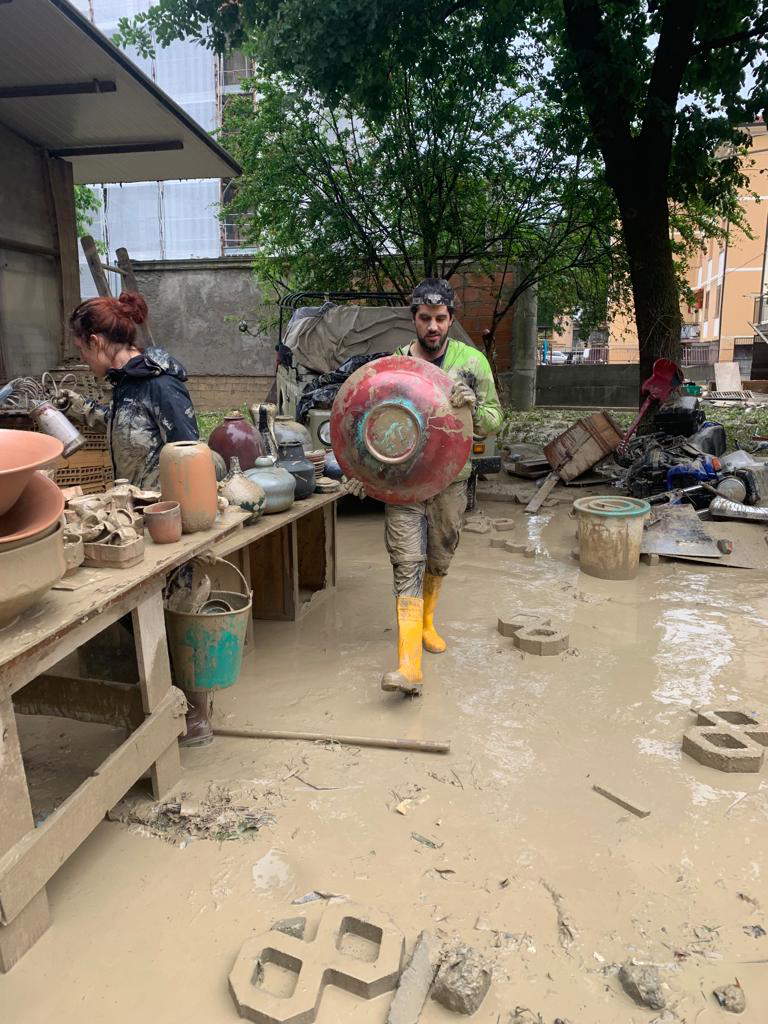 Ceramics
Ceramics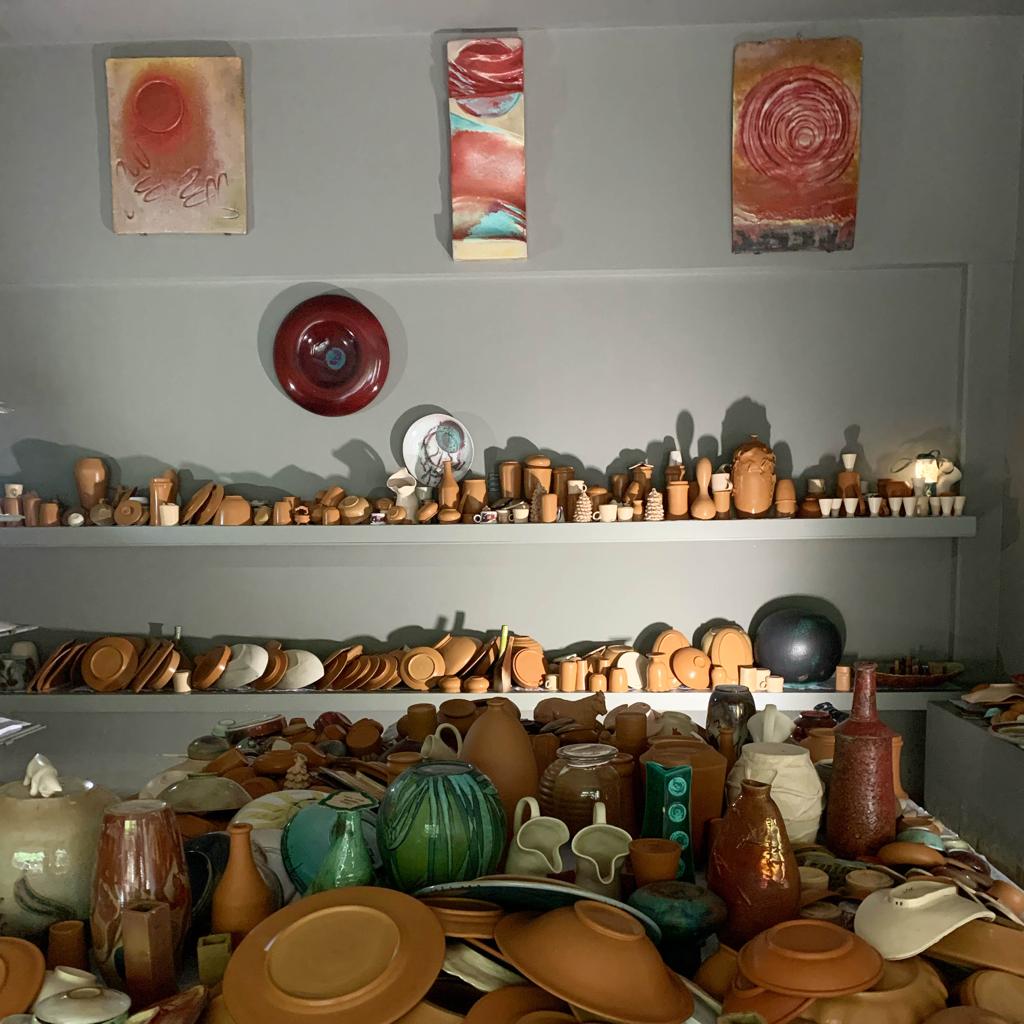
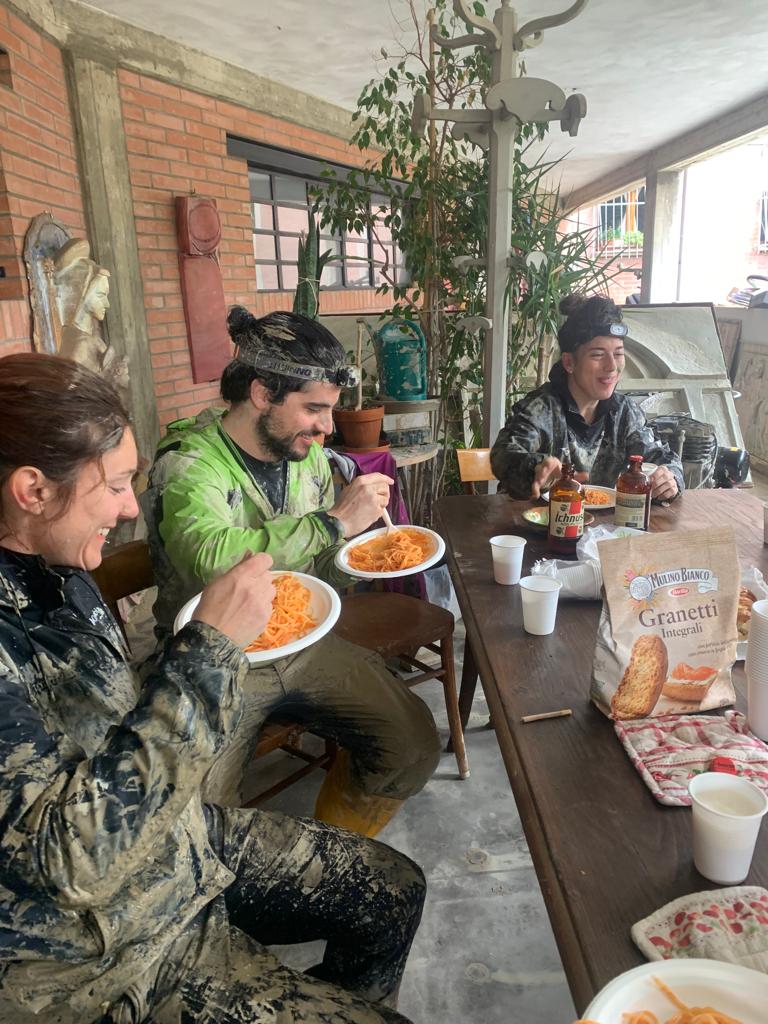
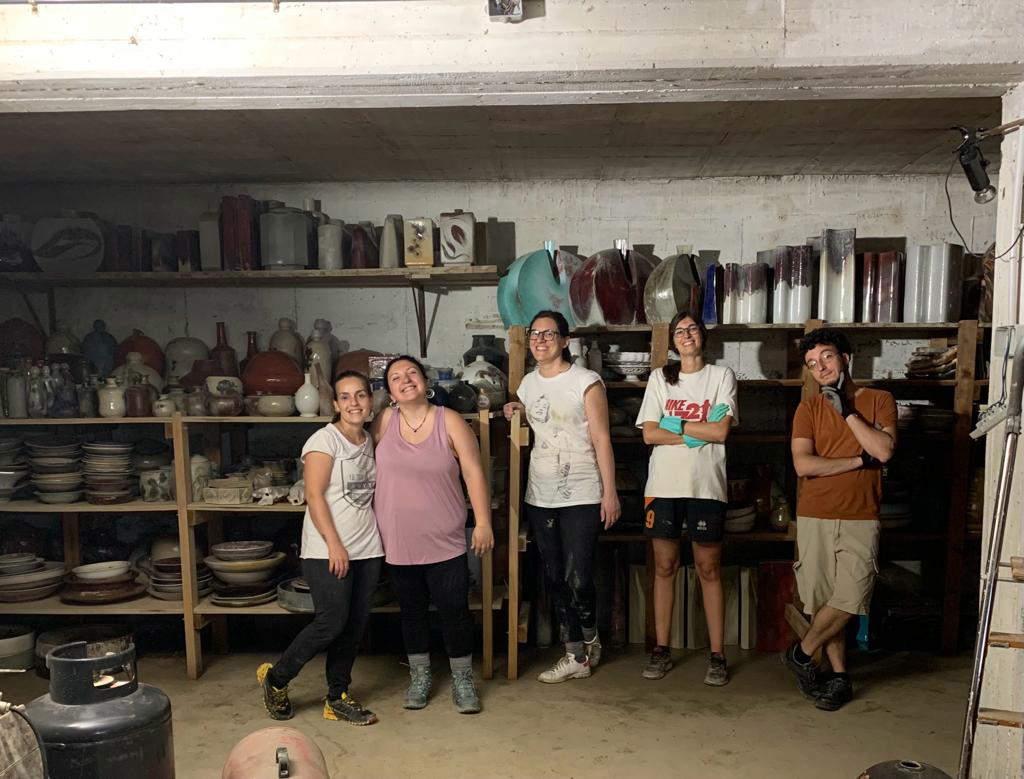 Ceramics
CeramicsMartina Scarpa, Alloy Ceramics
On May 16, 2023, Faenza, and many other towns in Romagna, were completely covered by their own very famous earth, clay. So many houses have been filled with this river of clay, and even our workshop has not been spared. Pottery, equipment, glazes, booths, kilns, furniture, books, documents, photographs, all completely immersed in a sea of clay that molded itself on Leandro’s molds, filled the kilns, changed the colors of the pottery and grass, drove machines, and made us one neighborhood without walls.
The image of that strange morning will be very hard to forget, but neither will I forget all the objects, papers, documents , brushes, pottery, that were being found and recovered as we went along. Cookie and glazed vases that floated, completely clean bowls of color that stuck to the ceiling and did not let water and mud in, historical notes from my grandfather that floated and were probably protected by the mud. I would never have found them otherwise, even my mother Carla did not know where they were. Pages and pages of glazes and descriptions of decorations, notes of glaze compositions, but also notes of the sheep census she had in her country house the Escape and drafts of her will. “They wanted to have themselves saved,” is what I often say to myself. There is no clear logical distinction between the things saved and the things lost, but what I am sure of is that “it was good for me,” partly because this flood gave me the opportunity to discover things I probably would never have found. It has given back a life to so many ceramics and given back a chance to the many test notes and glazes.
It also worked out well for me because I consider myself lucky. The other image that bounces back to me, and which above all always moves me, are the faces of all the people who came to help us: dozens of people every day, friends, acquaintances, clients, strangers, relatives, colleagues, relatives of friends, friends of friends, volunteers from all over Italy, anyone who showed up with shovel and boots and started getting mud from head to toe to rebuild with us. In those days I often thought about what Grandpa Leandro was thinking. I thought that he was definitely watching us and smiling at us with his big good face. I also thought that he was hugging everyone, and bringing that strange happiness and lightness that we used to breathe during the lunch breaks full of pasta and wine. We used to rest in those very places that used to be dedicated to Grandpa’s friends gathering to drink wine and make small talk and discuss pottery. A heartfelt thank you to everyone. Words can never express the best, but every day when I enter the workshop I breathe that very air there: lightness, joy and gratitude for each of you.
Our workshop in Via Fratelli Rosselli is used to being in contact with clay and dust, and because of that we are sure it will get used to new life again. A new life, a post-flood life that can only be better.
Ilaria and Giampaolo (Pantou Ceramics)
We are Ilaria and Giampaolo, young professionals in the field of contemporary artistic ceramics, a couple in both life and work. We were born and raised in Caltagirone, Sicily, and, following our desire to work independently, we moved to Faenza to give birth, with hard work, determination and sacrifices, to Pantoù ceramics, our handcrafted contemporary ceramics brand, born in 2020. In August 2022 we opened our workshop, on the ground floor of a historic building in downtown Faenza, and moved into the adjacent apartment. Here we lived and worked until the day of the second flood.
On the night of May 16, after civil defense announcements, our neighbor and friend Marina invited us to move to her apartment on the second floor, right above ours. Anyway, despite the alarm we had received, none of us residents of the building - four in all - expected anything so serious.
As a precaution, we took our camera, laptop and tablet with us. Then, without too much worry, we chatted until around midnight, when we realized that the river water had reached the old town, and that the flow was converging right under our building! So we rushed to the lab to try, confusedly, to do something about it. As the water flowed from the hallway inward, we secured, on the first-floor landing, the electric lathe and a compressor, which we use to set up the airbrush with which we glaze and decorate ceramics. Soon after, we had to leave the ground floor and face the night, helpless, all sleeping at Alex’s house, our neighbor on the second floor. The next morning, that of May 17, as soon as the water level dropped, we went down to check: both the house and the workshop had suffered very serious damage.
Immediately after this catastrophe, we felt unable to make any decision, even the most trivial one. Then, the spirit of solidarity played a key role in the process of processing and recovery. All those who helped us clear and clean up the spaces where we had lived and inhabited until just before, which had become impassable within minutes, represent the first manifestation of unconditional generosity we received.
During the days following the flood, in addition to the friends and acquaintances who came to help us, we also met many people we did not know until then, who also came to lend a hand as volunteers. Their help was very important materially and also psychologically: before their arrival we were stuck and did not have the lucidity to figure out what to do and how. With some of them (for example, Letizia, owner of an independent bookstore for children and young people, who came from Bologna together with her boyfriend Paolo and sister Maria ) we exchanged contacts, with the promise to meet again soon.
At the moment [end of July, ed.] we are still living at Marina’s house, who has been hosting us for two months, waiting to find a new apartment. Feeling the closeness of old and new acquaintances, but also of public and private entities, both from Faenza and Caltagirone, has given us the strength to start again.
Fortunately, all our finished pieces remained intact: they floated in the flooded workshop. As soon as the water receded, the vases, jugs, and cups rested gently on the floor and shelves. The same happened to the objects inside the kiln, which we had filled a few days earlier. Of course, our ceramics got covered with mud, but together with friends and volunteers, we meticulously cleaned them up. The International Museum of Ceramics in Faenza has given us the opportunity to set up a studio at the Muky Matteucci Palace, which we are sharing with other professionals affected by the flood. This is until November, with possible extension. This is where we have been able to move all our pottery, shelves, some household utensils and our clothes.
Under these paradoxical circumstances, we were also sought out and found by some journalists. It was strange and at times disorienting to suddenly find ourselves with cameras and microphones pointed at us at such a traumatic moment and having to tell what we had lost and what was happening to us, sharing our emotions with hitherto unknown professionals and imagining the presence and reactions of the public that would see or hear those minutes of reportage.
The Cannizzo Forni company of Caltagirone chose to help us through the construction and donation of a new electric ceramic kiln. Meanwhile, while we are waiting for this kiln to be shipped, the Mondial Tornianti Gino Geminiani association in Faenza has given us free use of its space and work equipment. There have also been many cash donations that we have received. We are grateful to those who have helped us and continue to do so.
Going through all of this, we have felt that our work, what we have built and completely dedicated ourselves to over the past few years, has value not only for us but also for other people, who believe in us enough to help us without wanting anything in return. This, too, has given us the strength and courage to commit ourselves to carrying out our project. Both as human beings and as artisans, we feel more aware of the impermanence of life and feel more that we are part of a community. Contrary to what we have heard and thought so far, we have found that there is much solidarity even among potters.
Our approach to daily life has definitely changed: we cannot make long-term plans, so, for the time being, we focus on performing small daily tasks and solving immediate problems while waiting to resume our activities in a more, as they say, normal way. We feel that we still have a long way to go, both logistically and psychologically. After these painful events, we believe the courage to carry on with our work and life projects has also been saved in us, a courage that we could never have found on our own.
Even before the flood, we felt like making new ceramics: in fact, we were working on some prototypes and new colors. Now, we are looking forward to having everything we need to start experimenting again, true to our way of being and doing.
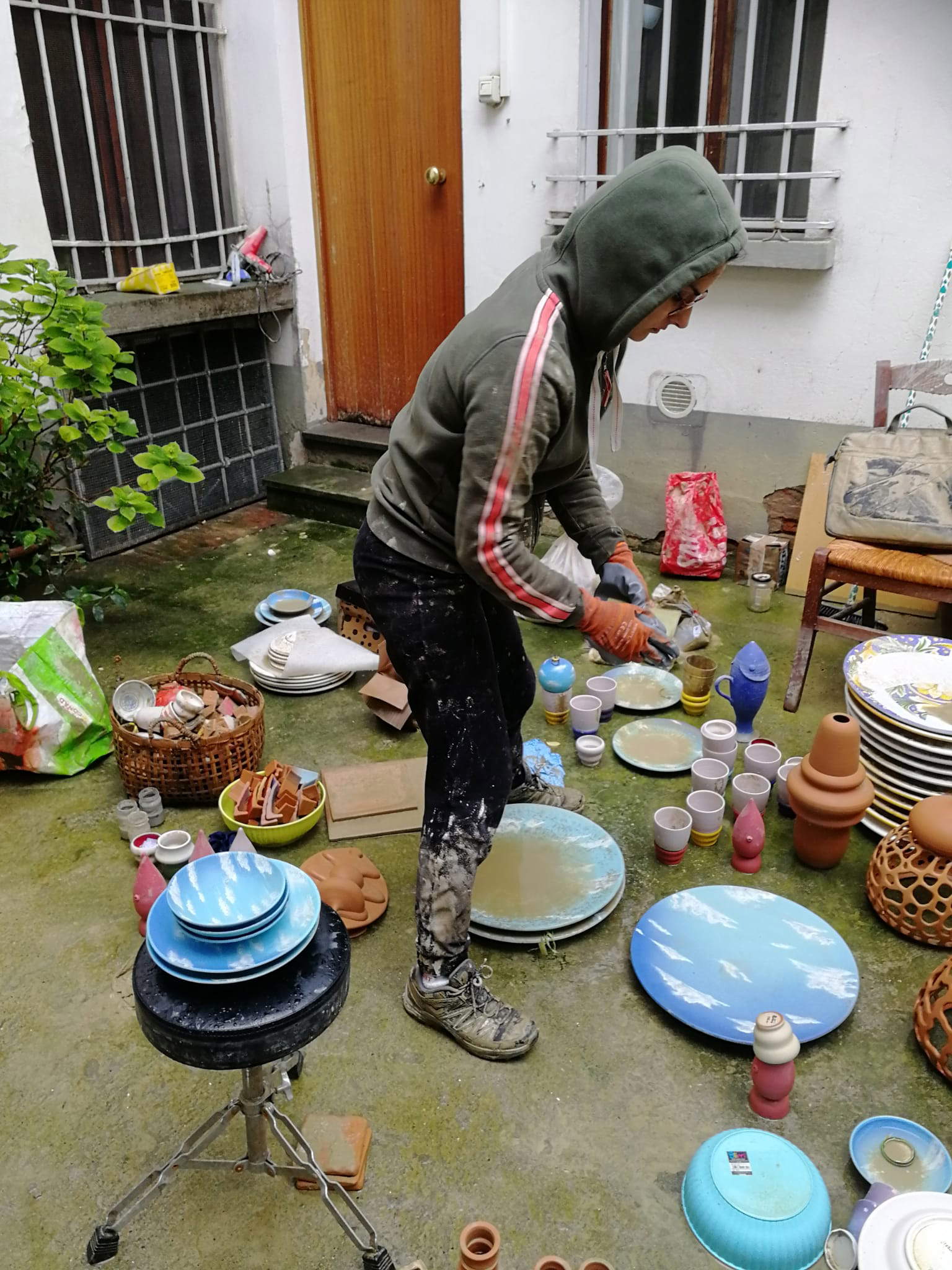
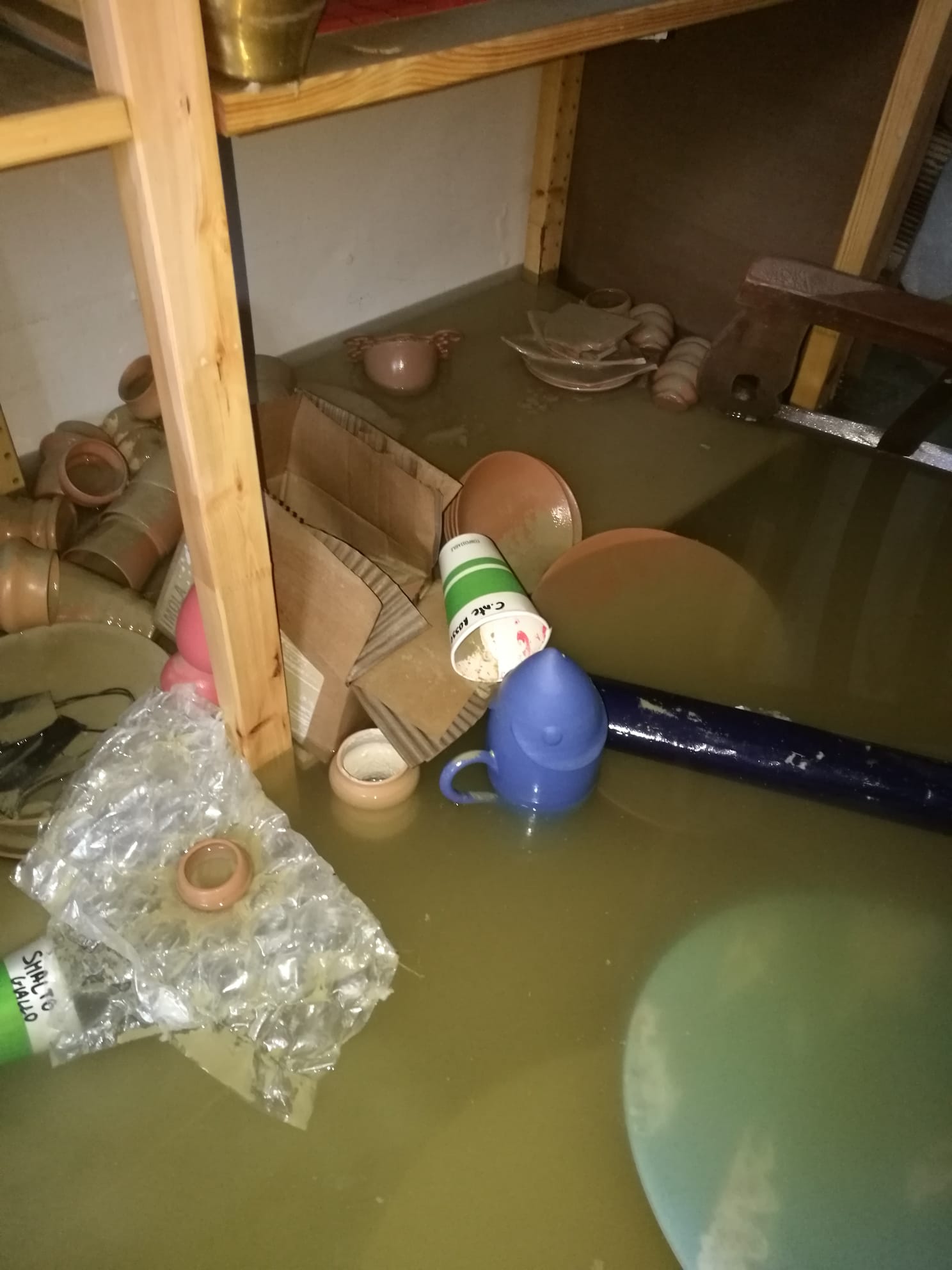 Pantoù
Pantoù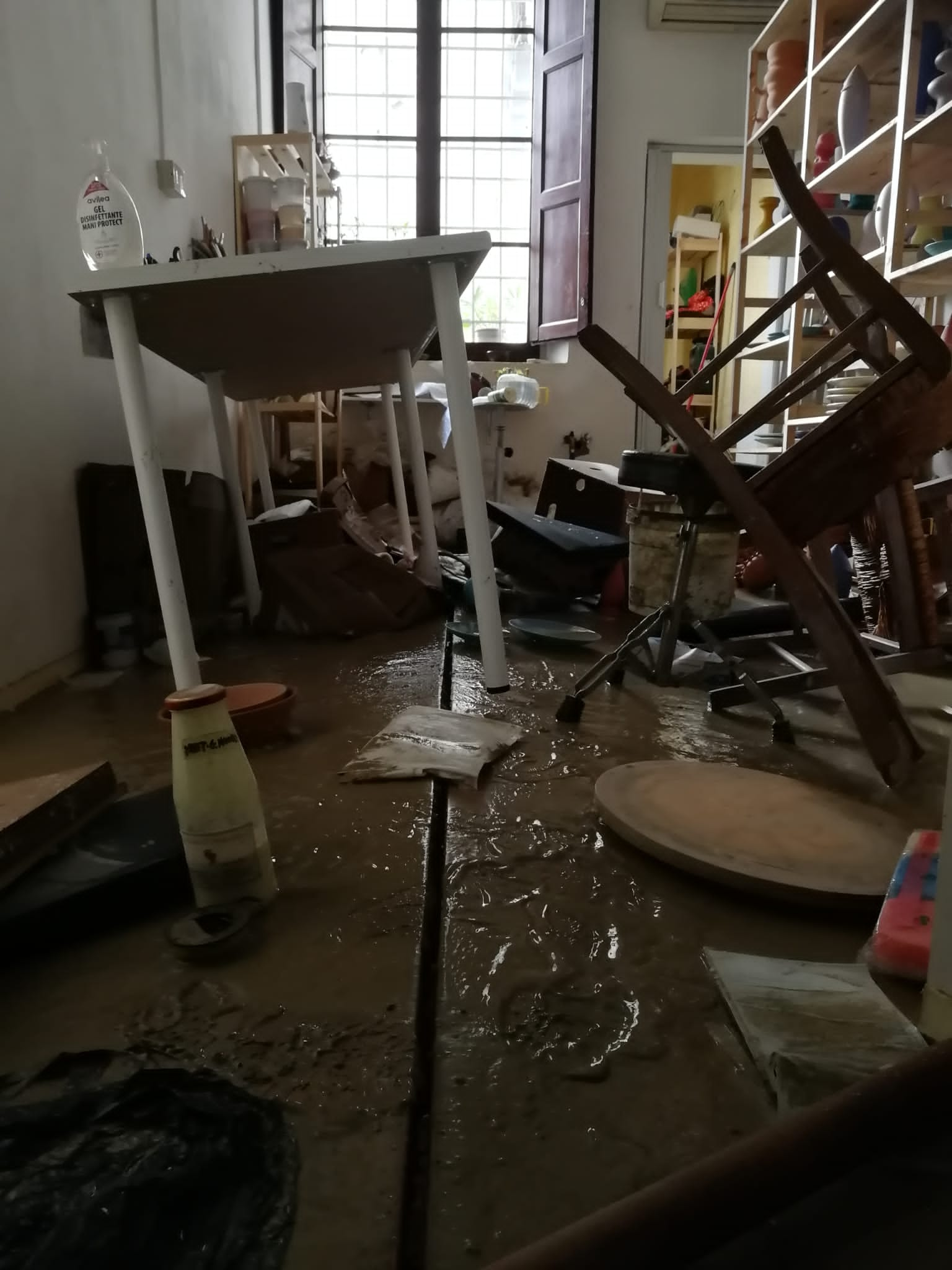 Pantoù
Pantoù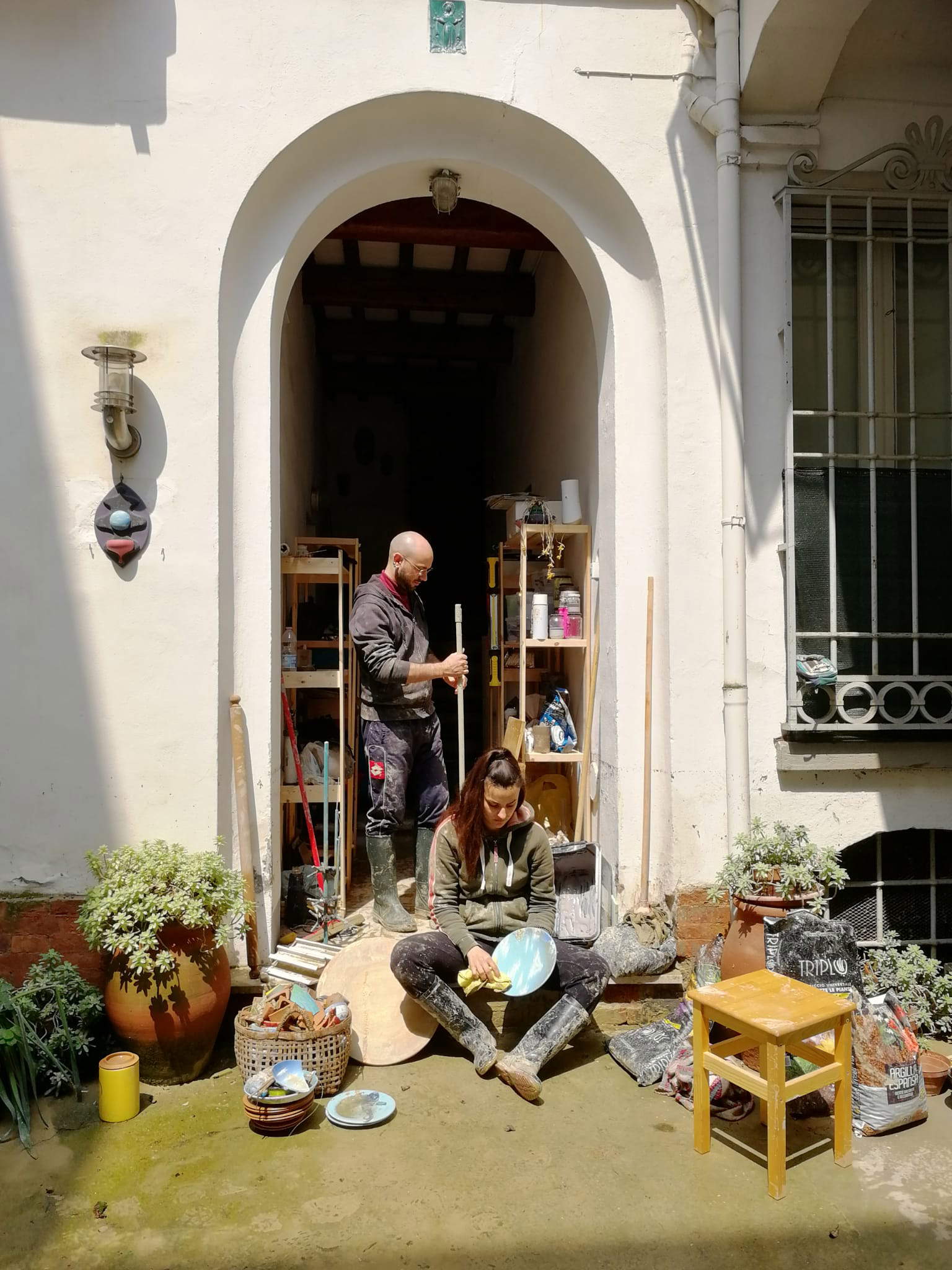 Pantoù
Pantoù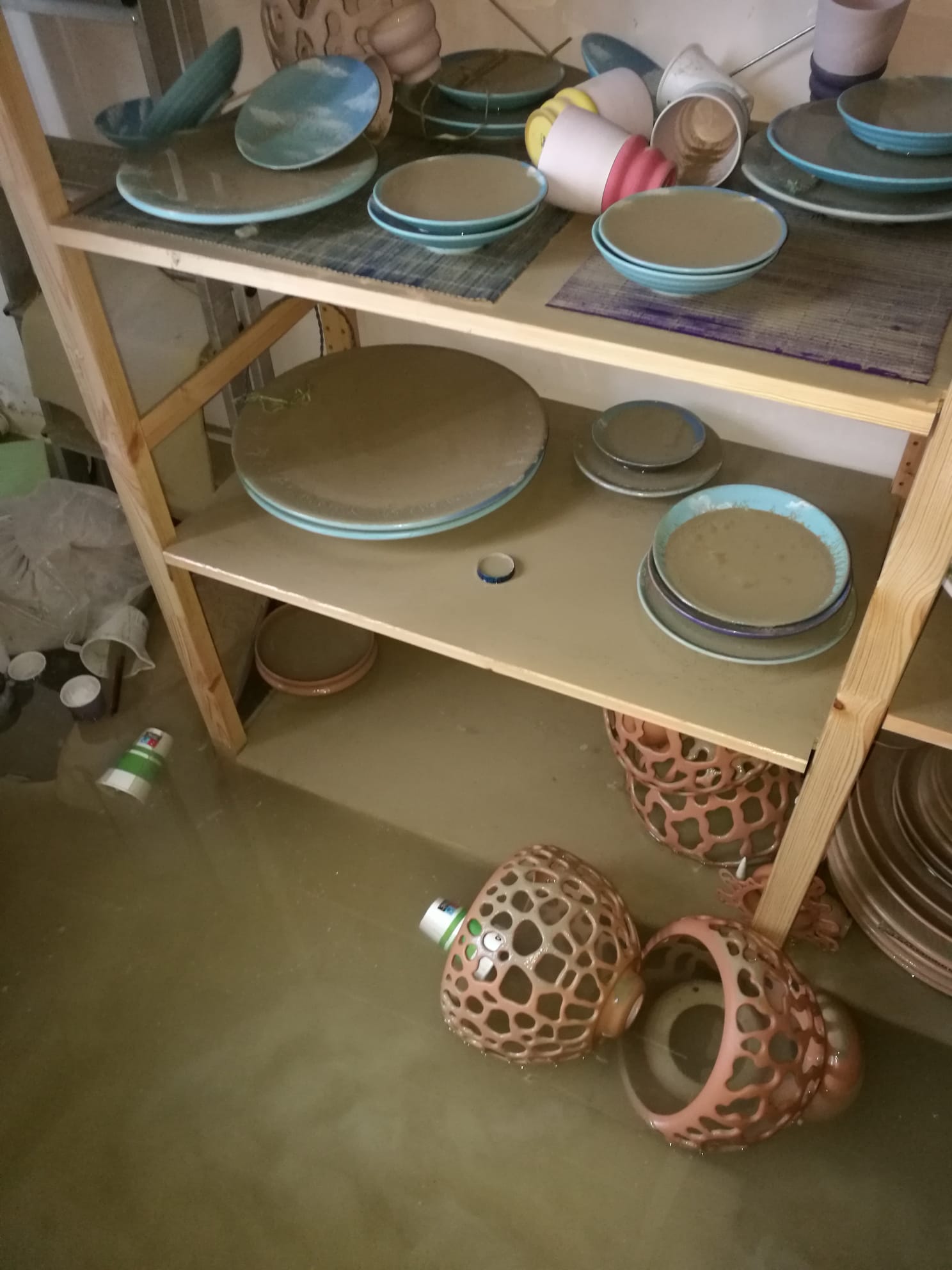 Pantoù
Pantoù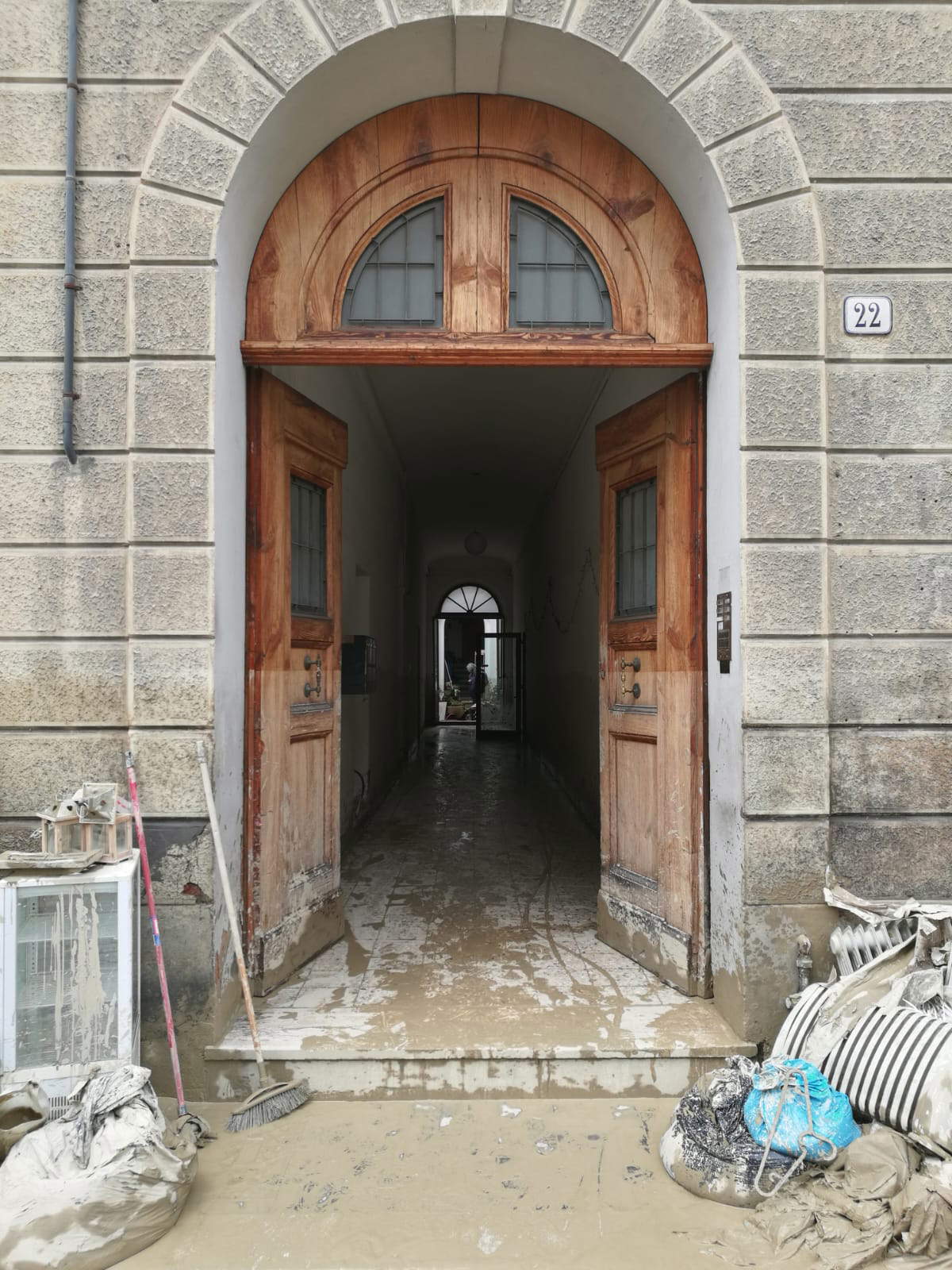 Pantou
Pantou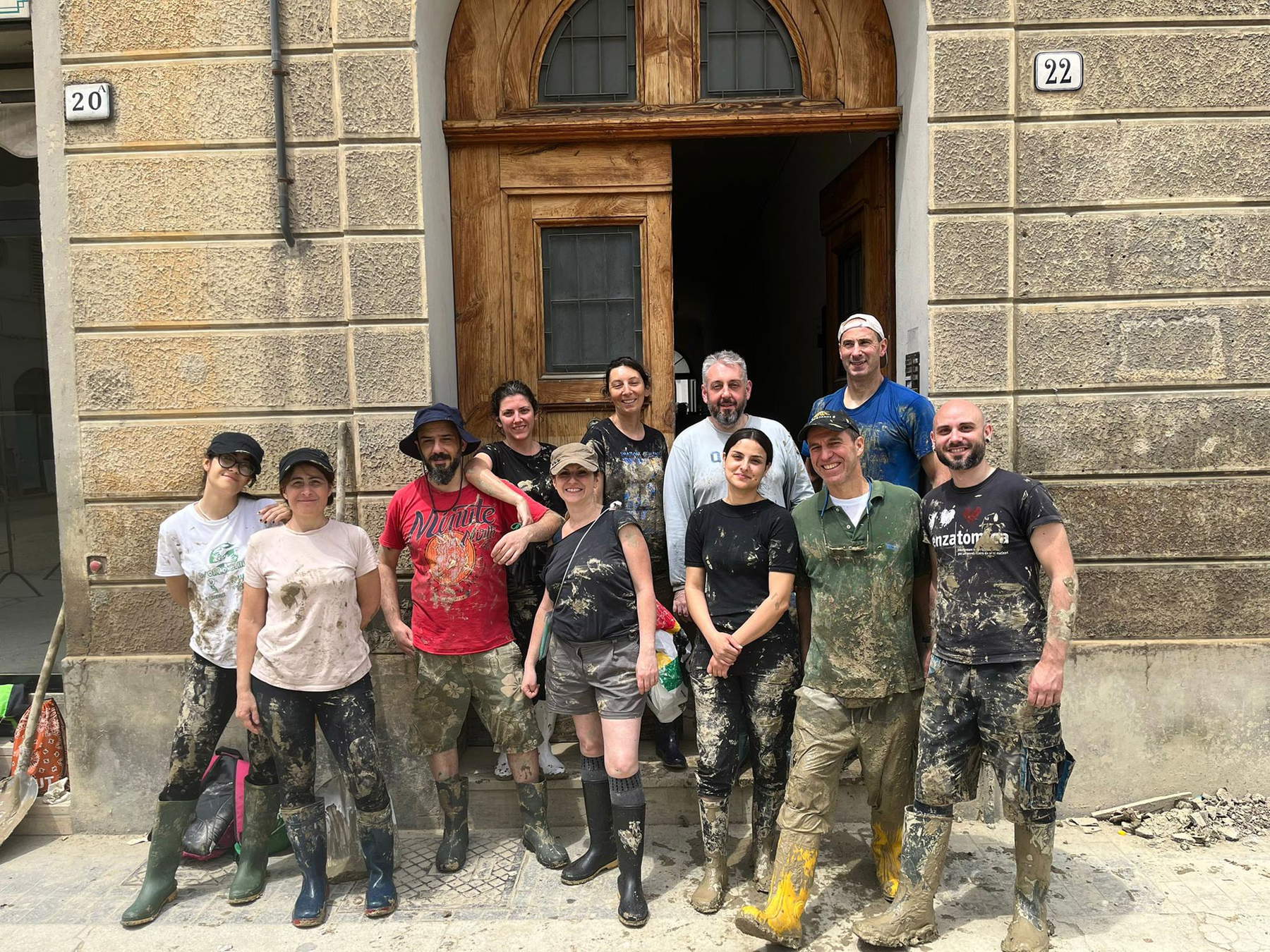
Letizia, Mariateresa and Paolo (volunteers)
That climate change is imposing itself in our daily lives is before the eyes of all people who have inhabited the world for at least a few decades and find themselves within events previously recounted only in movies, television reports on distant states and continents, or within dystopian novels. When, last May, we woke up in the midst of the flood that swept through Emilia Romagna and Marche, it did not seem possible how much was around us.
Paolo, Mariateresa and I, respectively from Abruzzo, Rome and Lucania, arrived in Bologna between 2019 and 2020. Here we found a supportive community, a land that mirrors much of our ideals, that still offers opportunities and that knows how to be grateful to those who respect it and are willing to take care of it.
Not that elsewhere we wouldn’t have done the same, but when we saw how the flood had ripped through the lives of so many people and places, tearing apart their appearance and memory in some cases, we didn’t even have to wonder what to do: we bought the necessary supplies to dive into the mud, shovel it out, throw away everything that had become unrecognizable and unusable, and joined the other thousands of volunteers. Paolo and I had never been to Faenza, and when we saw it covered in mud and dust, with piles of furniture and bags of garbage along many streets (central, suburban, multi-lane or single), rags and clothing on the tops of trees bent by the Lamone flood, we felt like we were in a war scenario. Mariateresa, on the other hand, had been there a few weeks earlier for a Sunday outing, and when she returned there to help, she had difficulty recognizing the features.
Fortunately, the people.
On both the first and second Sundays in Faenza, we found ourselves together with people of all ages and places: Fabien, a young man of about 30, who had come from France especially to help; Rosi who had arrived from Modena with her husband and daughter not even 20 years old; a retired couple who had come from Como; Michele, a Bolognese doc, who, like us, dedicated his Sundays to volunteering; and then lots of people from Tuscany, Veneto, people who had come from everywhere with the sole aim of helping by their own means whoever lived there.
Beneath the mud, the rain, which also surprised us the second time, the darkness of buildings without power and the stale stench of garages and basements underground, we found a beautiful humanity, eager to accompany each other, albeit in catastrophe, to make lives and places of civilization shine as quickly as possible. A humanity distant from the indifferent and angry humanity that is most often recounted in the media.
And then Ilaria and Giampaolo.
When they told us their story, we empathized immediately because we, Mariateresa and I, have a ceramist mom. So it only took us a quick glance to realize how much they had lost, what must have been and was no longer there in what was their workshop, as well as in their home.
To them and to all the people who have seen sacrifices, memories, investments in the future drowned, we continue to stay close with our thoughts and with what, even at a distance, could and still can be done.
In the hope that climate change will finally be moved to the top of the priorities of any political class, lest more people be disrupted by tragedy and lest, therefore, fewer people-besides the state-have a chance to help.
Warning: the translation into English of the original Italian article was created using automatic tools. We undertake to review all articles, but we do not guarantee the total absence of inaccuracies in the translation due to the program. You can find the original by clicking on the ITA button. If you find any mistake,please contact us.




























